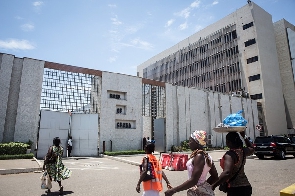 The Bank of Ghana Headquarters
The Bank of Ghana Headquarters
The Receiver of defunct uniBank Limited, Nii Amanor Dodoo, has told an Accra High Court that the management of the bank misreported the true financial position in their financial reports submitted to the Bank of Ghana.
According to him, the said reports were produced by the management team of uniBank and not by anyone in a sole capacity.
The Receiver further told the Court that the financial reports of uniBank submitted to the Central Bank, however, went through its internal processes. He also detailed that the misreported documents further communicated a false reality of the true situation at the bank.
During a court hearing presided by Justice Bright Mensah sitting as an additional High Court Judge, the Receiver cited one Benjamin Ofori who was said to have, in his sole capacity, failed to submit any such report directly to the Central Bank.
He added that Mr Ofori who served as the executive head of Credit Risk of uniBank from 2016 and 2018 did so as apart of uniBank’s management team.
Nii Amanor Dodoo said these misreported documents to the BoG entailed fictitious loans, amounts siphoned out of uniBank by shareholders and fictitious income generated by the loans.
He also emphasised that Benjamin Ofori played a pivotal role in the issue.
The Receiver explained that Mr Ofori as part of generating the fictitious loans was fully aware that details would form part of financial reports which were submitted to the BoG and other stakeholders.
He also informed the Court that the accused person, Benjamin Ofori played a key role in opening fictitious accounts and assisted with memos with regards to the creation of fictitious loans.
Counsel for Benjamin Ofori on his part referred the Receiver to a memorandum dated 30th November 2016. This memo, according to the Nii Amanor Dodoo formed the basis on which the purported loan of GH¢14 million was disbursed to Fuzak Construction.
But the Receiver told the Court that the account to which the fund was disbursed into was not the regular Fuzak Construction but a fictitious one which was subsequently transferred to the shareholders’ account.
This development, according the Receiver led him to distinguish between fictitious and irregular loans which he explained that an irregular loan may be a loan approved by a person beyond his approval limits.
“Where a person intentionally included a fictitious account number and presented a memo seeking approval as if it were a regular thing, that loan could not be described as irregular,” the Receiver clarified.
He went on to detail that the memo of November 30, 2016 had an inscription “subject to the terms and conditions stated in the individual letters” by Mr Benjamin Ofori. According to him, the inscription sought to give the impression that the fictitious loans were regular.
The Receiver however admitted that although Benjamin Ofori did not unilaterally approve the loans, he was expected to ensure that memos which were channeled through him contained the right and accurate facts to avoid any form of illegality.
He further told the Court that no offer letters were generated with regard to the fictitious loans.
Meanwhile, the case has been adjourned to 11th,12th and 13th July 2023 at 12:00pm for continuation.
Watch the latest edition of BizTech below:
MA/FNOQ